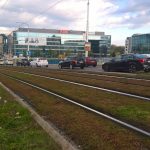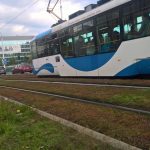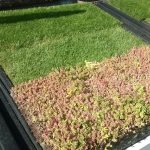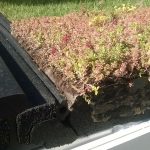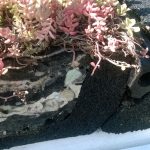Tram transport noise absorption project
 Projects
Projects
 Projects
Projects
Ostrava’s busiest tram routes feature unique new Czech-developed technology which absorbs and damps noise and vibrations produced by trams – especially the noise produced by the rolling contact between the wheels and the rails (metal on metal) and the traction motors.
The BRENS® system combines rail noise absorption and water retention functions, and it is made entirely from recycled materials originating in the automotive industry (recycled rubber from old tyres and recycled synthetic/technical textiles used in car production). These zero-waste products are excellent examples of the circular economy, and they use synthetic industrial waste products in an entirely new and innovative way. Thanks to the properties of the synthetic base material STERED®, the noise-absorbent surface can be covered with turf (real or artificial) or succulents (stonecrops). Most types of surface provide very good noise-absorption properties while also enabling the retention of moisture; this has a beneficial impact on the urban climate, reducing dust and mitigating overheating of street surfaces.
The BRENS® system can be installed on existing tram lines as well as in the construction of new lines. To improve tram safety and traffic flow while also reducing noise and vibrations, low, lightweight, easily removable anti-noise barriers can be fitted on either side of the tram lines; the barriers are made of recycled synthetic material in wire mesh moulds, which can be planted with low-maintenance local plants.
Ostrava is planning to lay grass turf in the central strips of roads where tramlines are located.
A pilot section of 150 metres has been chosen on the eastern approach to the road/tram bridge between the Karolina and Naměstí republiky tram stops; this has one of the steepest gradients in the city’s tram network (and thus creates considerable noise). In this case, low-maintenance plants (stonecrops) have been used instead of standard grass turf. Currently, standard tramline strips are made of concrete panels or asphalt; this reflects noise and increases dust. The cost of the project will be approx. 192 000 EUR.




